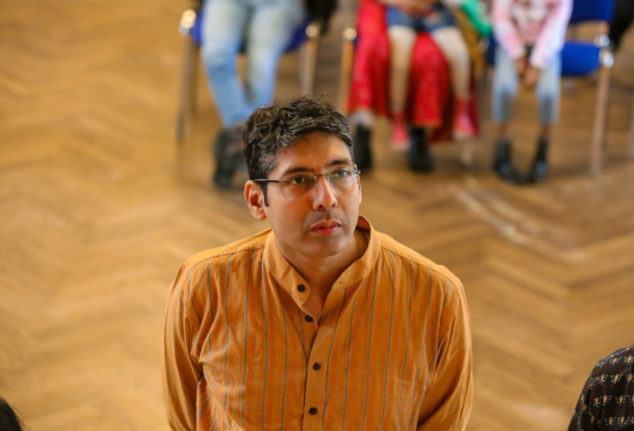Working as an IT consultant for Sogeti, Debjyoti was moved around to various countries as part of different projects throughout his career. In 2014, he finished a job in England, after which he was sent to Sweden to work with companies such as Ikea in designing new systems and upgrading their old systems.
However, once he arrived in Helsingborg he missed the Indian culture.
“Once you are away from home, you want your culture, your tradition, you want to remain in touch with your roots and you want your family, especially the younger generations, to also have some kind of attachment with the traditional stuff,” he tells The Local.
As a result, Debjyoti helped set up Sambandh, a society to connect the more than 2,000 Indians based in Helsingborg, many drawn there, as Debjyoti, by Ikea’s IT development hub in the city.
The society aims to help Indian newcomers have a smooth integration process in Sweden, by providing information and translation assistance.
“We also focus on helping them with basic stuff like how to open an account in the bank, guidance on getting a driving licence in Sweden, so that it is easier for them to seamlessly integrate locally. We also help with information about the school system and the healthcare system,” says Debjyoti.
“It is not easy for a new person coming in here and knowing all this, especially as most of the things are written in Swedish.”

The society also regularly collaborates with the Indian embassy to organise an “Indian Embassy Consular Camp” which allows Indians in Helsingborg to use the embassy’s services without having to travel for five to six hours to Stockholm.
The name of the community comes from the Hindi word sambandh, meaning relationship, which is similar to samband, the Swedish word for connection. Sambandh has grown to over 400 members, welcoming everyone no matter their background.
“We only have one event which is specific to our members, that is our members’ picnic, which happens every summer. Other than that, all our events are open to all and we invite all other communities. We advertise locally and try to get people from different backgrounds into our events,” says Debjyoti.
“We even have certain religious events, but even those events are open to all, open to people from all religions. We love the attention that we get from different communities, from people from different backgrounds, different countries, different religions, speaking different languages,” he says. “So if you are at any of our events, you will see so many different kinds of people.”
Holi or Indisk Fiesta is another event that is celebrated by the society with the aim of welcoming springtime. Along with that they celebrate World Environment Day to inspire their younger members to care for their surroundings.
“We encourage our kids to participate in World Environment Day. They make small projects, they plant trees, they talk about and learn about recycling stuff. We make them aware of the environment and everything that day,” he says.

Sambandh’s sports club also plays an important role, keeping the society’s members fit and healthy.
“There is a typical habit within the Indians. Once we have families, we get more focused on our kids and we spend all our energy on our kids’ education, kids’ sports activities, kids’ cultural activities. We forget about ourselves. So, we encourage our members to participate in sports. In India, sports like cricket and badminton are very popular, but with the help of local sports bodies, we encourage our members to participate in sports like padel, which is more popular in Sweden.”
When Debjyoti and his family moved to Sweden in 2014, their son was just one year old, and he got a place in a local preschool. Both Debjyoti and his wife thought it would be best to settle down since it would be difficult for their son to be moved around from country to country due to their work. He also says that Sweden is a great country to raise a child in.
“Gradually we liked Sweden because of the work-life balance, the equality, and several other good stuff. Especially when you are a family with a kid, Sweden is like a paradise. So then gradually we made Sweden our home and we continued staying here.”
When they bought their home in Helsingborg, they received a warm welcome from their neighbours, and he said that they continue to do so.
“I bought a house outside Helsingborg in a village, and a lot of people advised me not to, because they felt local Swedish people are not very open. They don’t become friends very easily. But I had a completely different experience and I was so well supported by my neighbours,” says Debjyoti.
“They even mowed my garden when I was away for a month to India. And I returned the favour. When they were on their way to the recycling centre, they used to knock on my door: ‘Do you have anything to throw away? Then I can help you,’ and I was like, OK, what I heard is probably not true. People are warm, they are welcoming. So I actually have a very, very positive view of Swedes.”
As president of Sambandh, Debjyoti is tasked with keeping the society’s aim in the forefront.
“My main objective is to keep our objective in mind and make sure the organisation is driven in a way so that we become a melting pot for all the different communities, the local Swedish community, the other immigrant communities. And of course, so that our kids, our future generations, remain rooted to their traditions,” he says.
He hopes to see the younger generations take over Sambandh so that it keeps going and growing.
“We would love to have our younger generation to manage and drive these events because they are more exposed to the local culture because they are in the local schools and all, which is of course good. It is easier for them to integrate completely.”



 Please whitelist us to continue reading.
Please whitelist us to continue reading.
Member comments